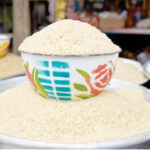Trade in Primary Produce
Before export of crude oil started to generate about 90 per cent of foreign exchange earnings for the government, the profile of the Nigerian economy was such that it was agrarian even as proceeds from export of agricultural produce helped to fund the first wave of development in the country after her independence in 1960. The groundnut pyramid profiled the economic strength of the north. Cocoa and palm oil were produced in commercial quantity in regions of the south. I remember cotton from Nigeria was something of a national flag in the international commodity market, underlining the quality of agricultural produce that was grown in Nigeria’s vast arable land.
We can only assume that the country would have transited from export of primary agricultural produce to adding value to the commodities through processing and packaging before we export the products, had we not happened on oil. Therefore, it would have been conjectural that our economy would be on the trajectory oil has taken it. However, unlike high level corruption that is associated with the oil industry, there was no significant evidence that proceeds from export of the agricultural produce were misappropriated in those heydays when the groundnut pyramids greeted the skylines in northern Nigeria and bagged cocoa was ubiquitous in the southern parts of the country. This is a unique differentiation of agriculture from extractive industry commodities which fuels not only corruption but conflicts also in developing countries of the world. Nevertheless, the country could not have fully achieved her revenue potentials from export of raw agricultural produce; just as it is the case with major oil economies which fail to diversify into industrial activities. Agro-processing should become a significant part of industrial activities in Nigeria. To optimise the foreign exchange income from our agricultural production, we will have to process and package, and sell excess outputs abroad once local consumption demand for a particular produce has been met.
The “A” in NEXIM’s MASS Agenda
Agro-processing is the “A” in the “MASS” Agenda of Nigerian Export-Import Bank. As early as 2009, when the executive management of the bank, which I lead, came into office, efforts to reposition the bank to meet the trade objectives of the federal government started in earnest. Accordingly, we identified agro-processing as one of the sectors to refocus the bank’s lending and advisory support.
One of the many reasons for which we set this sectoral priority is the undoubted comparative advantage Nigeria has in agriculture. It is because of its vast land, with large portions of it arable, that Nigeria is not one of the most densely populated countries of the world in spite of the huge population that is now estimated to be over 170 million. Nigeria’s largely fertile soil, complemented by favourable climatic conditions, supports good yields for a large number of variegated and different food and cash crops. The country is home to traditional farmers. Although they operate at subsistence level, their produce nevertheless accounts for 40 per cent of the GDP. The implication is that the key resource inputs for a vibrant agro-processing industry are readily available in the country, perhaps safe technology.
Secondly, agro-processing is an important frontier of economic transformation in Nigeria. The potential results of good policies to support the sector are multi-dimensional. The immediate gain would be saving of foreign exchange that is expended on importation of food items yearly. We already know that, including sugar and fish, we spend over $10 billion annually on importation of rice and other grains which either grow locally or can be substituted with local alternatives. The local alternatives are less appealing because of poor processing, notably, Ofada rice. Where that is not the issue, we have supply shortfall because of post-harvest yield losses to inadequate storage facility, poor transportation and handling practices, and for some produce, especially fruits and vegetables, harsh weather conditions.
Therefore, the low entry barrier for agro-processing, granted that modern packaging is very important, can reduce post-harvest losses and accelerate industrial production in Nigeria. This is important to NEXIM Bank. Part of our aid to the trade policies of the government is to invest in businesses that can help conserve foreign exchange. There is hardly any other sector that can do this better than agro-processing, particularly the food segment. NEXIM Bank has been investing in this sector. Some of the investee businesses have gained capacity to distribute their food products internationally, especially within the West African trading bloc. This is helping to realize the other part of our twin objectives which is facilitation of export revenue growth outside of the hydrocarbon industry.
The other very important impact of a vibrant agro-processing sector is employment generation. The jobs in this sector are not necessarily salaried, although, we have seen the emergence of some businesses (co-financed by NEXIM) which collectively employ several thousands of Nigerians directly, and tens of thousands indirectly. However, a lot of the jobs to be created in this sector are for micro, small and medium scale entrepreneurs (MSMEs).
Specific Interventions and Outcomes
Between 1991 and 2003, Nigerian Export-Import Bank funded the agric sector (mainly agro-processing) to the tune of N27.2 billion. This represents 28.6% of our total credit portfolio. However, there has been acceleration in the pace of the interventions since the inception of the current executive management. From August 2009 till date, NEXIM Bank’s intervention in the sector is total N7.4 billion, representing 21.2% of portfolio size contributed in less than five years in total 22 years of the Bank’s sectoral intervention. The modest pace of growth will be leveraged in the immediate future, as my leadership of the bank initially prioritized audit of preceding lending practices, and we have had to put in place a robust risk management framework to ensure portfolio performance. Coupled with this, the successful businesses we have funded in less than five years provide practical knowledge of how and where we can scale up our interventions.
As I had alluded to the job-creation potentials of the sector, our intervention has created and supported 16,338 direct jobs since 1991. Since 2009, direct 4,452 jobs have been created and supported.
Our facilities have mediated the generation of $219 million. In accordance with the recent growth trend, $62.3 million has been earned in foreign exchange by the businesses we facilitated.
New National Policy Fillip
Under the current Administration, the Agricultural Transformation Agenda (ATA) being implemented by the Federal Ministry of Agriculture has boosted the agric sector. One aspect of the programme entails the establishment of Staple Crop Processing Zones which will utilise private sector approach in engaging commercially-oriented rural women, youth and farmers in developing commodity value chains and in engendering broad-based growth. I see that this programme can help in incubating the cottage and SME food processing businesses, with some of them growing to attract growth capital in the coming years.
The ATA also embodies investment in infrastructure to reduce loss of produce in transit from rural, peri-urban and urban cities to markets. In line with this, some states are already coordinating plans to establish agricultural infrastructure corridors to boost transfer of produce. Here again, I see opportunities for growth of infrastructure-linked portfolio for financiers in the country. But in terms of boosting food security, conserving foreign exchange and indeed generating non-oil export income over the medium-to-long term, the Cassava flour milling programme will yield dramatic results. NEXIM Bank is ready to continue to provide the requisite support to this and other national programmes that will help save the government foreign exchange revenue and boost local food self-sufficiency.
Roberts Orya is Managing Director/Chief Executive Officer Nigerian Export-Import Bank.
Agro-processing as frontier for economic transformation
Trade in Primary ProduceBefore export of crude oil started to generate about 90 per cent of foreign exchange earnings for the government, the profile of…



